- Home
- Mark Pryor
The Book Artist Page 11
The Book Artist Read online
Page 11
When he stepped onto Rue Jacob, he was glad to see that the rained had stopped, bathing the street in weak but bright sunshine. The wind had sharpened, though, and he was relieved to have put on his heavy coat. The familiar journey across the River Seine up toward the Tuileries took him twenty-five minutes, and his face glowed warm when he stepped into the lobby of the Crillon, from the exertion and from escaping the cold.
Rachel Rollo was already there, and as Hugo sat down across from her, a waiter arrived with a cart of food. He unloaded two china tea pots, and two plates of tiny, thin sandwiches. He then set up a tiered tower of pastries, some English, like the fruit cake, and some French, like the mille-feuille. The waiter said nothing as he went about his work, like an artist creating a mouth-watering display for its viewers to demolish.
“You do wonder, does anyone ever finish all this?” Rollo said when the waiter had departed. “They say it’s for two people, but for heaven’s sake, you could feed a nation with this spread.”
“I imagine most of the people who stay here are used to having more than they can consume, and aren’t too bothered about the waste.” Hugo smiled. “Present company excepted, apparently.”
Rollo looked around. “We do get pretty comfortable, but this place is a bit of a splurge even for us.”
Hugo pictured the man with the bunny rabbits in the underground, what he might be able to manage with all this food. “Will they box it up to go, do you think?” he asked.
“Surely they pay you enough to buy groceries, Mr. Marston,” she said with a laugh.
“Almost. But I was thinking of someone else.”
“We can ask when we’re done. Help yourself, in the meantime.” She poured herself some tea, and Hugo did the same. Her face seemed to crumple a little and her eyes misted when she looked up at him. “I can’t believe this has happened. Especially to Alia, she was such an angel.”
“This must be hard for you,” Hugo said.
“It is, but I don’t even care about that. What kind of person would do that? And to someone as wonderful and kind as Alia?”
“That’s what I aim to find out.”
“Please do, there’s a monster out there right now, and he can’t be allowed to get away with it.” She stiffened her spine, as if hoping her resolve would fall in line too. “So, ask me whatever it is you need to know.”
“Thank you. First off, did you get your issue at the museum sorted out?”
“Oh, yesterday. Thank you, yes. The manager wasn’t sure what was happening with Alia’s pieces, so for now they’re going to move them into just two of the rooms and put Dalí’s art back in the main room.”
“Makes sense,” Hugo said.
“Interestingly, but perhaps not surprisingly, there’s a lot of attention on Alia’s work since . . . it happened. Ghoulish interest, I would call it.”
“Doesn’t that always happen when an artist dies?”
“Very often, yes. More so when it happens like this.”
Hugo nodded, then he was silent for a moment. Eventually, he said, “You mentioned that the police came by earlier.”
“Yes, they’d wanted us to go to them, but honestly. So cold and rainy, and it’s not like we know anything.”
“So they came here, to you.”
“Yes. Just like you did.” She smiled and held up a plate of sandwiches. “Look, they even cut the crusts off, like we’re little children.”
Hugo refrained from making the smart remark on the tip of his tongue, instead taking two of the cucumber sandwiches. He’d thought these laughable when he first had a proper English tea when stationed in London, but he had quickly come to appreciate the lightness. He thought of Tom again and was suddenly glad his friend wasn’t there to see him eat cucumber sandwiches. Not Tom’s idea of a meal.
“I suppose the first question they and I will always ask is, do you know who killed Alia? Did you see anyone go into that room where she was found?”
“No, and no.” She frowned. “Do you know how much I wish I did?”
“I can imagine. Do you have any clue who’d want to hurt her?”
“I know she was feuding with Josh . . .” She shrugged. “Honestly, I can’t think of a single other person. Not that I would dream he’d do such a thing, but I guess you never know.”
“Your husband thought it laughable to suggest that Josh Reno would hurt Alia. Even her stepbrother, who can’t stand Reno, said there’s no way.”
Rollo shook her head. “I’m not surprised. Men and women look at these things quite differently. I don’t know if you know that.”
“I’m not sure what you mean.”
“It’s hard to explain.” She took a sip of tea. “When you walk down the street, what are you thinking about?”
“I guess it depends on what’s going on in my life. Work, lunch . . .” Hugo shrugged. “What are you getting at?”
“So there’s not one thing that’s always in the forefront of your mind when you go out in public?”
“No, I don’t think so. Like I said, it depends.”
“See, for women it doesn’t depend. When I . . . when most women, walk down the street, we’re wondering how far we’re going to get before someone gives us some unwanted attention. Maybe a comment on our figure, or what we’re wearing. Maybe they cross the street and end up trying to chat with us, or maybe they just say hi. I can’t tell you how many times I’ve been told, by complete strangers, that I should smile.” Rollo gave an exaggerated smile. “People I don’t know and don’t care about think it makes me look friendlier, prettier. Which, of course, I should do, because as someone who owes them nothing else, I owe them that as a woman.”
“That’s very rude,” Hugo began, “I’m sorry if—”
“Not if, when. My point is, of course men look at each other and say, Oh, him? No way he’d hurt a fly. They don’t see what men are capable of, normal men, executives as well as construction workers. They don’t see the daily assaults, I believe they now call them ‘microaggressions,’ that women are subjected to every day. If men like my husband, Alia’s stepbrother, and probably you, are blind to our lifetimes of abuse, do you think it’s possible they might also be blind to a man’s ability to seriously hurt, even destroy, a woman?” She sat back, teacup in hand. “There, I lectured you on male privilege without using the word privilege, how do you like that?”
Hugo bought himself a moment to think by cramming two miniature egg sandwiches into his mouth. He was impressed, unsettled even, by what she’d said. He’d read a lot recently about privilege, gender- and color-related, and had tried to be more aware. But she was right, he didn’t see these regular aggressions, and while he’d not taken JD Rollo and Rob Drummond’s word for Reno being incapable of violence, he’d not challenged, in person or in his own mind, where those assumptions had come from. He washed the sandwiches down with some tea.
“Your point is very well taken,” he said finally.
“Spoken like a true diplomat.”
“Well, technically, I’m not one but, yeah, I’m still processing.”
“Keep processing, if you don’t mind. The more male processors we have running, the better. And don’t ever tell a woman to smile, whether you know her or not. Especially if not.” Rollo picked up a tiny éclair with her delicate fingers. “Now, back to Alia. What else can I tell you?”
“Is it true that she’d decided to cut ties with you and your husband?”
“Good heavens, who told you that?” She popped the éclair into her mouth and chewed slowly, without taking her eyes off Hugo.
“Is it true?”
She shook her head and swallowed. “No. Not at all. Why would she do that?”
“I have no idea. Maybe after this show she figured she’d be well-known enough that she wouldn’t need your help. Maybe she just wanted her independence.”
“I mean, if the show was a massive hit, maybe she could afford to. And in any case, she wouldn’t know that until afterward. But it doesn’t even
really work that way.”
“What do you mean by that?”
“It’s complicated, but my point is, even if this exhibition had been a world-beating hit, come the end of the week, she’s not going to be rolling in money. And even if she was, and on top of that she won the lottery, why would she just cut us out like that?”
“Like I said, I have no idea.”
“Someone thinks that’s true, though.” Her voice was firm. “I’d like to know who.”
Hugo shook his head. “I can’t tell you, but I will say it wasn’t represented to me as a forgone, completed decision on her part. In other words, the person who told me wasn’t completely sure they were right about it.”
“Very reassuring,” Rollo said dryly.
“Yes, well.” Hugo gave into temptation and picked up an English-style scone. He went about the business of halving it, slathering on butter, and topping both halves off with thick strawberry jam. “One of my many weaknesses,” he said, before taking a bite.
She arched an eyebrow. “Tell me about your others.”
“I couldn’t possibly,” he said when he’d finished chewing. “I’m curious, did the police indicate whether they’d be talking to you again?”
“You mean, whether my husband and I are suspects.”
Smart lady, that’s exactly what I mean. “I’m sure they wouldn’t put it that way.”
“Put it this way,” Rollo said. “They asked us not to leave Paris just yet.”
“I see.”
“Mind if I ask you a question?”
“Not at all.”
“Who is Claudia Roux?”
Hugo paused, then said, “Why?”
“That detective, he asked me if I’d known you before the opening at the museum. Of course, I said no. He then asked if I knew someone called Claudia Roux. He went on to ask more questions about her, even though I said no. Questions about you and her, to be specific.”
“She’s a friend.”
“Girlfriend?”
“A friend,” Hugo said firmly.
“He made it sound like he had something on her. He didn’t ask me about anyone else that way, not Josh, or my husband. Just this Claudia Roux person.” Rollo plucked a small jam tart from a middle tier. “And that makes me wonder if you’re supposed to be here talking to me about this. Does the French cop know?”
“That I’m here? No, I didn’t tell him.”
“Well, that’s OK.” Rollo smiled. “When necessary, I can be very discreet indeed.”
CHAPTER FOURTEEN
For several minutes, Tom was stumped.
The man he was after, Rick Cofer, had obviously chosen his hotel with care. Amsterdam’s Sint Nicolaasstraat, where the hotel was located, was a narrow, cobbled street that, for the most part, was effectively walled in on both sides by the buildings that fronted the busier pedestrian streets either end of it.
From the map on his phone, Tom saw that the Rijks Hotel sat right in the middle, a Tudor-beamed structure that fronted the little street and was almost impossible to surveil. Making Tom’s life harder, or at least more frustrating, was the fact that while he could have found somewhere to lurk at either end of Sint Nicolaasstraat, Cofer could easily turn left out of the hotel instead of right, and Tom would never see him.
But he had no other option, and, it being Tom, he decided to make the most of a bad situation. He started in the Amsterdam Cheese Company on the corner of Nieuwendjik and Sint Nicolaasstraat, taking in the rich aromas of its various wares and nibbling at samples offered by staff as he lingered near the large windows. When the store’s employees started giving him looks and by-passing him with their samples, he sighed and, after checking that the coast was clear, he stepped outside.
Even on a cold December Sunday there were plenty of people about, and at least one of them was smoking something strong. The skunky odor hung in the air, and Tom silently thanked the passer-by for sharing his stash, before moving across the street to a cramped grocery store. He picked up a basket on the way in and positioned himself with a half-decent view down Sint Nicolaasstraat from the back of the store. He watched shoppers come and go, but he grew increasingly impatient when no one left or even entered that street. After thirty minutes, the owner, a small, thin man with a bushy mustache, approached and spoke to him in Dutch.
“Sorry, I’m American,” Tom said, looking over the man’s shoulder.
“Ah, yes. You don’t speak other languages, of course.”
“That’s a little harsh,” Tom said. “I speak a few, and know how to say fuck in half a dozen. Just not yours.”
“It’s rot op. Now, are you planning to buy something or just stand in my shop all day?”
“It’s not just me, you know,” Tom said. “I mean, lots of Americans speak Spanish. Especially recent immigrants, but then you’d expect that.”
“Sir, I asked you a question.”
“And my friend Hugo speaks, like, four languages. Some better than others, but it’s still pretty impressive, don’t you think?”
“Yes, very. Why are you just standing in here?”
“Waiting for a friend. Now, me, I think my accent is better than Hugo’s. I was trying not to boast, but since you asked me directly . . .”
“I didn’t ask you.” The man had gone from haughty to frustrated. “Not about that, anyway. This is a grocery store not a waiting room.”
“French, Italian, Spanish, German, some Russian. That’s a hard one, Russian, did you know that they have their own alphabet?”
“Yes, I did. I’m sorry, but I’m going to have to ask you to—”
“I mean, who does that? Why not use the normal alphabet like everyone else? Seems like they’re just making things harder for themselves.”
“Sir.” The man’s tone was forceful. “Please leave.”
“Well, that’s not very nice.” Tom adopted a hurt expression. “This how you treat all your customers?”
“You’re not a customer!” the man said, almost shouting. “You’re just standing here, blocking the way.”
“I tried not to, I promise. That’s one reason I picked up this basket and didn’t use one of those big carts. Then I’d have blocked the way for sure.”
“We don’t even have any of those!”
“Right, that’s the other reason I didn’t use one.” Tom patted the man on the shoulder. “Well, nice chatting with you, but I have to get going. Have to see a man about a horse.”
The owner’s face crinkled with confusion. “Horse? There aren’t any horses here . . .”
But Tom was past him, and at the exit he dropped his empty basket into the rack and strolled out into Nieuwendjik, eyes peeled for Rick Cofer, and another place to linger.
He stationed himself on a bench with a somewhat distant and limited view of the entrance to Sint Nicolaasstraat, and a much closer view of the two grimy feet that belonged to a homeless man who took up three-quarters of the bench. The feet Tom could ignore, it was the putrid stench that arose from the man every time he shifted that made the bile rise in his throat.
But ten long minutes later, a flash of adrenaline surged through him when he spotted Rick Cofer walking directly toward him.
Cofer was unmissable. Already a tall man, he’d lost the bulk he carried a decade or so ago through either age or prison exercise, and his rangy frame was adorned with the bright-orange soccer shirt of the Dutch national team. He looked older, which was not surprising, but Tom was interested to see how relaxed he seemed.
For a man on a suicide mission, you’re pretty chill, Tom thought. But you’re here. You really are here. Tom stared at the figure of one of the men who’d murdered his sister and, as far as Tom was concerned, had gotten away with it.
As Tom watched, Cofer pulled a matching orange baseball cap, also bright enough to be seen from space, out of a rear pocket and pulled it low over his eyes.
Tom tried to sink deeper into his bulky raincoat and wide-brimmed hat, but Cofer didn’t even look his way, j
ust turned to his right and sauntered down Nieuwendjik. When he was fifty yards away, Tom peeled himself from the bench and followed.
Cofer acted like he had no mission, no goal other than to window shop in Amsterdam. He lingered in front of clothing stores, art galleries, even the weed shops, but he never went inside any of them. After twenty more minutes of slow going, Cofer stopped at a German-themed restaurant, studied the menu for a minute, and then went inside. Tom spotted a café, just past the restaurant over a small bridge, where he could get off his feet and watch. He hurried past the Ratskeller with his head down and turned away, and took a table inside the café by the window overlooking Nieuwendjik and, more specifically, Cofer’s watering hole.
Again, Cofer seemed to be in no hurry, and, after an hour, Tom worried the American might have slipped out the back of the restaurant. But Tom didn’t want to abandon his station and risk running into the man, so he sat tight and ordered another coffee and a second apple strudel.
At two o’clock, Cofer reappeared. Tom’s bladder was full, and his head buzzed from the sugar-coated pastries he’d eaten to pass the time, but seeing Cofer gave him another surge of adrenaline. Tom signaled for the bill, digging into his wallet for a handful of euros in case Cofer moved too quickly. But the man remained in no hurry, he just stood on the sidewalk, looked around, and stretched, almost like he dared anyone to spot him, to recognize him. Tom stood and watched as Cofer lit a cigarette and started to amble toward him, toward the narrow canal and the bridge that crossed it. He paused in the middle of the bridge, taking drags on his cigarette as he looked down into the water.
“Why the fuck are you here?” Tom muttered. He picked up his phone and used it to take a photo of Cofer, a wide-angle shot then one as zoomed in as he could make it. An elderly couple at the table next to him shot each other looks, either worried about the crazy American talking to himself, or less than pleased with his swearing. Tom ignored them, focusing instead on texting the pictures to Hugo, with the message, Don’t call me, I’ll call you. On his tail.

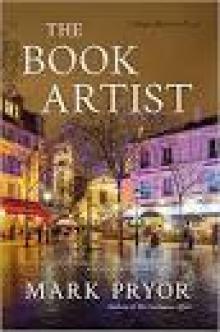 The Book Artist
The Book Artist The French Widow
The French Widow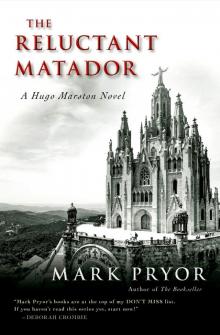 Hugo Marston 04 - The Reluctant Matador
Hugo Marston 04 - The Reluctant Matador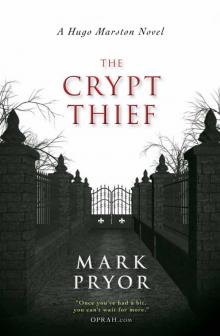 The Crypt Thief
The Crypt Thief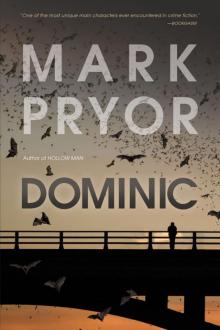 Dominic
Dominic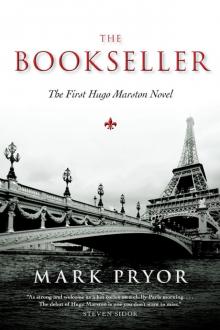 The Bookseller
The Bookseller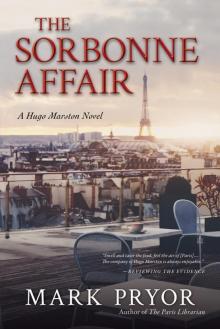 The Sorbonne Affair
The Sorbonne Affair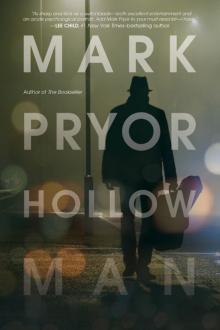 Hollow Man
Hollow Man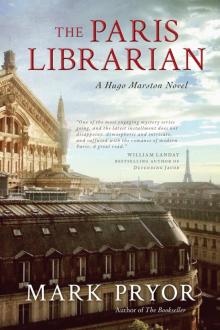 The Paris Librarian
The Paris Librarian